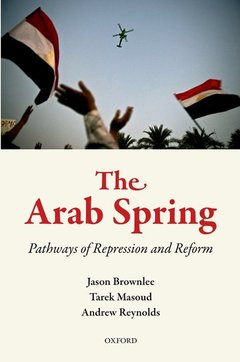The Arab Spring Pathways of Repression and Reform
Langue : Anglais
Auteurs : Brownlee Jason, Masoud Tarek, Reynolds Andrew

Several years after the Arab Spring began, democracy remains elusive in the Middle East. The Arab Spring that resides in the popular imagination is one in which a wave of mass mobilization swept the broader Middle East, toppled dictators, and cleared the way for democracy. The reality is that few Arab countries have experienced anything of the sort. While Tunisia made progress towards some type of constitutionally entrenched participatory rule, the other countries that overthrew their rulersEgypt, Yemen, and Libyaremain mired in authoritarianism and instability. Elsewhere in the Arab world uprisings were suppressed, subsided or never materialized. The Arab Springs modest harvest cries out for explanation. Why did regime change take place in only four Arab countries and why has democratic change proved so elusive in the countries that made attempts? This book attempts to answer those questions. First, by accounting for the full range of variance: from the absence or failure of uprisings in such places as Algeria and Saudi Arabia at one end to Tunisias rocky but hopeful transition at the other. Second, by examining the deep historical and structure variables that determined the balance of power between incumbents and opposition. Brownlee, Masoud, and Reynolds find that the success of domestic uprisings depended on the absence of a hereditary executive and a dearth of oil rents. Structural factors also cast a shadow over the transition process. Even when opposition forces toppled dictators, prior levels of socioeconomic development and state strength shaped whether nascent democracy, resurgent authoritarianism, or unbridled civil war would follow.
Jason Brownlee is an associate professor of Government and Middle Eastern Studies at the University of Texas at Austin, where he teaches courses on US foreign politics, Middle Eastern politics, and authoritarianism. Tarek Masoud is an associate professor of public policy at Harvard University's John F. Kennedy School of Government, where he teaches courses on comparative political institutions, democratization, and Middle Eastern politics. Andrew Reynolds is an Associate Professor of Political Science at UNC Chapel Hill and the Chair of Global Studies. He received his M.A. from the University of Cape Town and his Ph.D. from the University of California, San Diego. His research and teaching focus on democratization, constitutional design and electoral politics. He is particularly interested in the presence and impact of minorities and marginalized communities.
Date de parution : 02-2015
Ouvrage de 340 p.
16.5x23.4 cm
Date de parution : 02-2015
Ouvrage de 340 p.
16.2x24.1 cm
Thème de The Arab Spring :
© 2024 LAVOISIER S.A.S.



